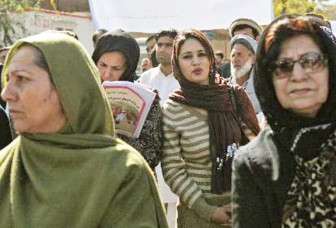MAZAR-I-SHARIF (Reuters) – After three decades of occupation, civil war, Taliban rule and a NATO-led military campaign, ordinary Afghans remain powerless and without a unified voice.
Many are too afraid to talk. The few that do speak out are barely able to share ideas with each other, much less address authorities.

“There is one thing missing in Afghanistan, which is the people’s voice,” said Saeed Niazi, an activist based in Kabul who aims to get ordinary Afghans much more involved in nation building as the country prepares for the exit of foreign combat troops by the end of 2014.
There are an estimated 1,000 civil society groups in the country but, with a literacy rate of about 28 per cent, most Afghans have no idea such groups exist.
Some groups are viewed with suspicion because of foreign funding but, without funding, they cannot exist.
“A civil society is still unknown for people in Afghanistan. They don’t understand it,” Kunduz province community leader Abdul Mohammed Aiymaq told a conference in Mazar-i-Sharif that drew activists from nine northern provinces in late October.
Underscoring the problem, Mohammed Kazem Amini, a newsletter publisher in Faryab province, told the meeting: “Even the people in the city do not know anything about the idea of a civil society, or what is democracy.”
Security fears mean lawmakers and district officials have very little direct contact with Afghans in areas where the insurgency is strongest, such as Taliban strongholds like Helmand and Kandahar provinces in the south, on the Pakistan border.
“The government in reality is very badly disconnected from the people, particularly in the insecure areas. Security is a big challenge,” said Aziz Rafiee of the Afghan Civil Society Forum. “None of these parliament members have been able to go directly back to their constituents and talk to them.”
US embassy spokesman Gavin Sundwall said civil society groups were vital in a country like Afghanistan, which lacks a robust system of political parties, so alternative views could be debated.
But poor security diminished the ability of such groups “to enhance their own capacity and legitimacy”, he said.
‘Killed and no one would notice’
The first half of this year was the deadliest for civilians since the US-backed overthrow of the Taliban 10 years ago, according to the United Nations Assistance Mission in Afghanistan (UNAMA).
It said 1,462 civilians had been killed in conflict-related incidents and blamed insurgents for 80 per cent of those deaths — up nearly a third on the same period last year.
The NATO-led International Security Assistance Force (ISAF), responsible for security in much of the country, says the picture is improving, but their figures exclude attacks that kill only civilians, as well as attacks on Afghan security forces operating without international troops.
“Security is not OK,” Aiymaq, the Kunduz community leader, told the Mazar meeting. “If we have security, then we will have peace-building.”
The London School of Economics (LSE) spent $20,000 backing the Mazar conference. LSE researcher Marika Theros said one activist told her: “You could speak out in the provinces and be killed and no one would notice.”
Western donors have channelled hundreds of millions of dollars to civil society groups, including larger Afghan non-governmental organisations, but some Afghans complain these are merely extensions of Western agencies and that cash has been creamed off.
Even when there is funding, workers have to be careful. Some aid groups, speaking on condition of anonymity, said they conceal that their money comes from the West for fear people their contacts could be killed, especially in dangerous provinces like those on the Pakistani border.
Besides violence, other major issues community leaders want to raise include jobs, women’s rights and education.
Abdul Ghani, a deputy provincial council chief in Sar-e-Pol, 295 km (185 miles) northeast of Kabul, said many of his province’s 340 schools were under tents and trees. Women were not being educated and were often mistreated by their husbands.
Ghani said corruption was also rife because government salaries were not high enough.





